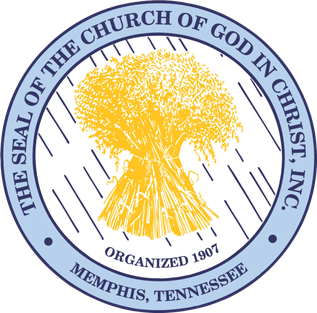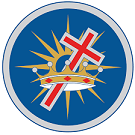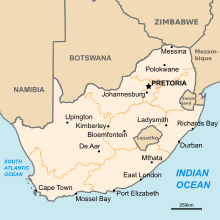A bishop is an ordained member of the clergy who is entrusted with a position of authority and oversight in a religious institution. In Christianity, bishops are normally responsible for the governance and administration of dioceses. The role or office of the bishop is called episcopacy. Organizationally, several Christian denominations utilize ecclesiastical structures that call for the position of bishops, while other denominations have dispensed with this office, seeing it as a symbol of power. Bishops have also exercised political authority within their dioceses.
A pastor is the leader of a Christian congregation who also gives advice and counsel to people from the community or congregation. In Lutheranism, Catholicism, Eastern Orthodoxy, Oriental Orthodoxy and Anglicanism, pastors are always ordained. In Methodism, pastors may be either licensed or ordained.

The Church of God in Christ (COGIC) is an international Holiness–Pentecostal Christian denomination, and the largest Pentecostal denomination in the United States. Although an international and multi-ethnic religious organization, it has a predominantly African American membership based within the United States. The international headquarters is in Memphis, Tennessee. The current Presiding Bishop is Bishop John Drew Sheard Sr., who is the Senior Pastor of the Greater Emmanuel Institutional Church of God in Christ of Detroit, Michigan. He was elected as the denomination's leader on March 27, 2021.

William Joseph Seymour was an African-American holiness preacher who initiated the Azusa Street Revival, an influential event in the rise of the Pentecostal and Charismatic movements. He was the second of eight children born to emancipated slaves and raised Catholic in extreme poverty in Louisiana.
The Latter Rain, also known as the New Order or the New Order of the Latter Rain, was a post–World War II movement within Pentecostal Christianity which remains controversial. The movement saw itself as a continuation of the restorationism of early pentecostalism. The movement began with major revivals between 1948 and 1952 and became established as a large semi-organized movement by 1952. It continued into the 1960s. The movement had a profound impact on subsequent movements as its participants dispersed throughout the broader charismatic and pentecostal movements beginning in the 1960s.
Prosperity theology is a religious belief among some Charismatic Christians that financial blessing and physical well-being are always the will of God for them, and that faith, positive speech, and donations to religious causes will increase one's material wealth. Material and especially financial success is seen as a sign of divine favor.

The Apostolic Church is an international Christian denomination and Pentecostal movement that emerged from the Welsh Revival of 1904–1905. Although the movement began in the United Kingdom, the largest national Apostolic Church became the Apostolic Church Nigeria. The term "Apostolic" refers to the role of apostles in the denomination's church government, as well as a desire to emulate 1st century Christianity in its faith, practices, and government.
The Indian Pentecostal Church of God (IPC) is one of the largest Pentecostal Christian Denomination in India, with over 10,000 congregations worldwide. Its organisational headquarters located in Kumbanad, Kerala, India. IPC has similarities with the Kerala Brethren denomination in terms of its beliefs on orthodoxy and eschatology, as a large portion of IPC's founders and early members were from the Kerala Brethren. IPC tends to shy away from ecumenism, and some of its leaders reject high church liturgy as a method of worship, instead opting for low church congregational worship.
The Apostolic-Prophetic movement is a US-based Christian movement founded in the early 2000s. It is a network of non-denominational alliances of independent churches and ministries.

The Apostolic Faith Mission of South Africa (AFM) is a classical Pentecostal Christian denomination in South Africa. With 1.2 million adherents, it is South Africa's largest Pentecostal church and the fifth largest religious grouping in South Africa representing 7.6 percent of the population. Dr. Isak Burger has led the AFM as president since 1996 when the white and black branches of the church were united. It is a member of the Apostolic Faith Mission International, a fellowship of 23 AFM national churches. It is also a member of the South African Council of Churches.
The Australian Christian Churches (ACC), formerly Assemblies of God in Australia, is a network of Pentecostal churches in Australia affiliated with the World Assemblies of God Fellowship, which is the largest Pentecostal denomination in the world.

The Assemblies of God USA (AG), officially The General Council of the Assemblies of God, is a Pentecostal Christian denomination in the United States founded in 1914 during a meeting of Pentecostal ministers at Hot Springs, Arkansas, who came from a variety of independent churches and networks of churches. The Assemblies of God is a Finished Work Pentecostal denomination and is the U.S. branch of the World Assemblies of God Fellowship, the world's largest Pentecostal body. With a constituency of 2,928,143 in 2022, the Assemblies of God was the ninth largest Christian denomination and the second largest Pentecostal denomination in the United States.

Jesse Delano Ellis, II, commonly known as J. Delano Ellis, was an American Protestant religious leader and progenitor of unity among African American Pentecostals with Trinitarian and nontrinitarian affinities.
Gay Apostolic Pentecostals are people who adhere to the beliefs of the Oneness Pentecostal churches and who identify as LGBT affirming. Gay Apostolic Pentecostals first began to organize separately from mainline Oneness Pentecostal churches in 1980 in Schenectady, New York.
The Apostolic Church of Pentecost (ACOP) is a Pentecostal Christian denomination with origins in the Pentecostal revival of the early 20th century. Although multi-national, ACOP has its strongest membership in Canada. In 2002 ACOP reported "approximately 24,000 members in Canada, with 450 ministers and 153 churches." There are ACOP churches in all the provinces of Canada. ACOP's headquarters is in Calgary, Alberta.

Christianity is the largest religion practiced in Zimbabwe, accounted for more than 84% of the population. The arrival of Christianity dates back to the 16th century by Portuguese missionaries such as Fr. Gonsalo Da Silveira of the Roman Catholic Church. Christianity is embraced by the majority of the population. It is estimated 85 percent of Zimbabweans claim to be Christians, with approximately 62 percent regularly attending church services. Christian faith plays a very important role in the organization of Zimbabwean society.
Jeffery Tribble is an ordained elder in the African Methodist Episcopal Zion Church and a professor of ministry with research interests in Practical Theology, Congregational Studies and Leadership, Ethnography, Evangelism and Church Planting, Black Church Studies, and Urban Church Ministry. Academics and professionals in these fields consider him a renowned thought leader. Tribble's experience in pastoral ministry allows for his work to bridge the gap between academic research and practical church leadership.

Hugh Osgood is a British church leader, conference speaker, author, and modern church historian. He was appointed Moderator of the Free Churches Group on 17 September 2014, following the resignation of Revd Michael Heaney. He is also the Free Churches President of Churches Together in England, the Co-Chair of the UK Charismatic and Pentecostal Leaders’ Conference, and the founding President of Churches in Communities International. He serves on the Councils of Reference of numerous organisations either as Free Churches Moderator or on his own right.
DOVE International is a Christian ministry founded by Larry and LaVerne Kreider involved with churches and ministries in five continents. DOVE is an acronym which stands for “Declaring Our Victory Emmanuel." Christian publisher House to House Publications has published over 50 titles, including Kreider's book House to House.










